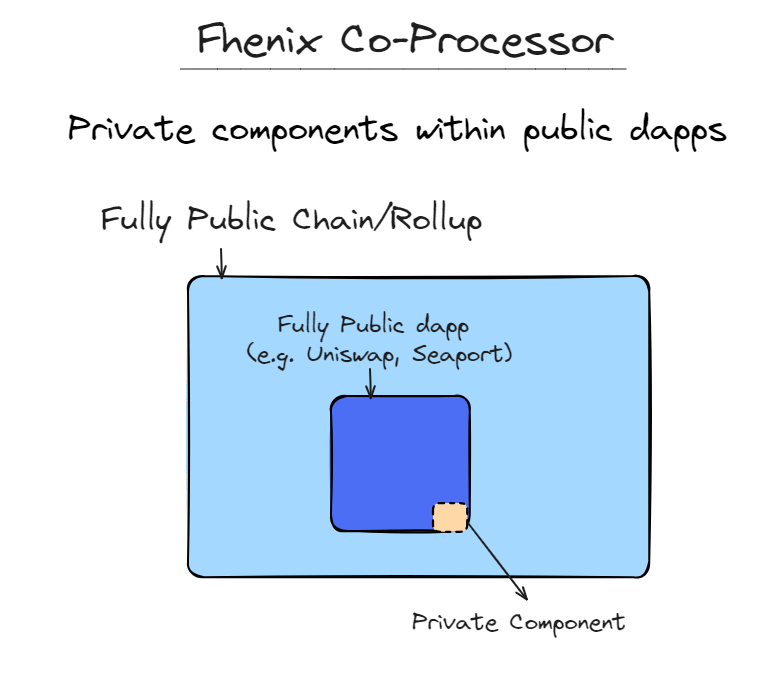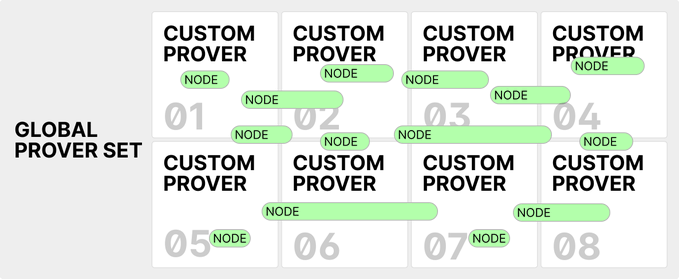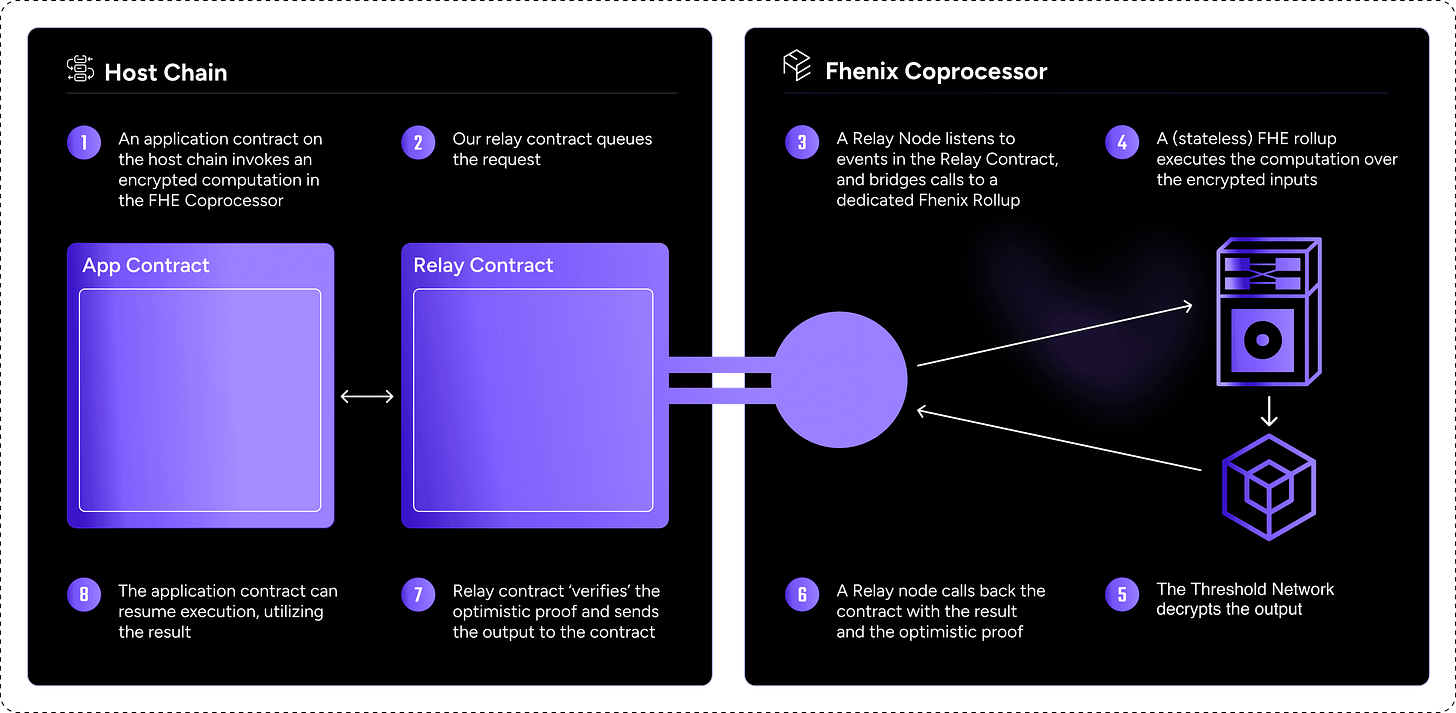Equilibrium Infra Bulletin #24: FHE co-processors, ZK x Modularity, new zkVM "Jolt" and more...
Equilibrium Labs builds the state-of-the-art of decentralized infrastructure. We are a global team of ~30 people who tackle challenges around security, privacy, and scaling.
🔍 FHE Co-Processors: Fhenix and Eigenlayer Join Forces For Next-gen Onchain Confidentiality
⚡️ Topic Summary
Last week, Fhenix announced they will collaborate with EigenLayer to develop an FHE co-processor. A coprocessor can be used for offloading certain computational tasks that are too expensive to do directly on-chain, meanwhile, fully homomorphic encryption (FHE) enables computation directly on encrypted data. An FHE co-processor combines these two concepts, enabling outsourcing costly computation while getting additional guarantees about privacy or confidentiality.
Rather than requiring developers to rebuild their applications on a new privacy-centric chain, this approach enables an existing application to outsource certain computations that need to be confidential, while keeping most application logic on a transparent blockchain. This would, for example, allow individual votes or NFT bids to remain private while only the result is published. Inco’s Confidentiality as a Service takes a somewhat similar approach.

FHE co-processors can add confidentiality to otherwise public apps (source) The validity of the computation in the Fhenix FHE co-processor is verified optimistically, which is cheaper than doing it with ZKPs but it introduces a long dispute period. This can be circumvented using economic security rented from EigenLayer restakers, which allows operators to give soft commitments much faster than the 7-day dispute period. As long as these operators have sufficient stake to back their commitments, they are incentivized to act honestly as any malicious attempts would lead to slashing later.
🤔 Our Thoughts
The fact that most blockchains today are still fully transparent is quite baffling and likely a huge barrier to entry for many participants. However, privacy in blockchains is a complicated concept that likely requires a combination of several modern cryptography solutions (ZKPs, FHE, MPC), which are still quite far from production-level scale. In addition, the term privacy has attracted quite a lot of negative associations, particularly related to blockchains and blockchain networks. Alternative terms such as information flow control proposed by Anoma might be more neutral in describing the issue at hand and enable conversations with various stakeholders. The fact remains that we have a huge effort ahead of us if we are to make blockchains secure and private, but it’s something we care deeply about at Equilibrium Labs (which for example is why we’ve been working closely with Aleo for more than three years).
Building a new chain from scratch and bootstrapping users & developers is no easy feat, which is why this plug-and-play approach taken by Fhenix and Inco (among others) is interesting. While it might make it easier for applications to introduce some privacy for a small subset of their components (such as voting), it doesn’t seemingly solve the issue of user balances and data still being fully public. It is possible, however, that this acts as a trojan horse for privacy and leads to more meaningful adoption down the line.
One question to ask is what new trust assumptions this approach introduces. Reliance on fraud proofs and economic security is one example, although this could be avoided if verifiable FHE (ZK proving a computation in FHE) becomes cheap and fast enough in the future. FHE is also still a relatively new and untested technology which poses some additional risks.
💡 Research, Articles & Other Things of Interest
🤓 Mechanism Design For ZK-Rollup Prover Markets - new research paper which among other things explores how sustainable prover market can form over time.
📚 Will ZK Eat The Modular Stack? Our latest research piece dives deep into the intersection of ZK x Modularity.
📚 a16z Research Team Releases Jolt, a new approach to zkVM design.
📚 Commoditising Your Complements With Modular Architecture - exploring which parts of the modular stack are most at risk of being commoditised, and what the implications could be.
🎧 Intent-centric Information Flow Control in Anoma - the talk covers privacy in intent-centric protocols and some research Anoma has done around it.
🔥 News From Our Partners
⚙️ Gevulot Announces Custom Prover Sets: The Custom Prover Sets offer a more flexible and modular approach to data storage and proof computation. Rather than attempting a one-size-fits-all model, this approach empowers users to choose the external software that best suits their operational needs and make use of prover sets designed for a specific purpose. While decentralized proving is a new piece in the modular stack, it’s rapidly increasing in importance. Innovation like this only makes it more expressive and flexible for the end user.

🤌 Personal Recommendations From Our Team
📚 Reading: Dark Wire - Joseph Cox: Even though the book hasn’t yet been released (expected June 2024), it has already piqued our interest. It covers the inside story of one of the largest law-enforcement sting operations ever, more accurately when the FBI made its own tech start-up (Anom) to wiretap the world. Shows how cunning both the authorities and drug traffickers have become, with privacy implications for everyone.
🎧 Listening: Paramore - Thick Skull: The last song on the album, which is their last album with their contract from Atlantic. Is there something symbolic with the music video as well?
💡 Other: Is Homer’s Odyssey Based In The Nordics?! Felice Vinci’s The Baltic Origins of Homer's Epic Tales lays out the argument that Homer's epic tales originated not in the Mediterranean but in the northern Baltic Sea. Whether this is true or not, it caused quite a stir internally.




